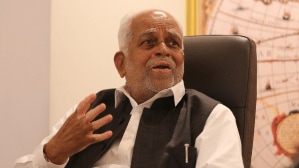Stay updated with the latest - Click here to follow us on Instagram
Sewri hospital’s TB patients get a healing touch
No more suicide attempts by patients since hospital hired counsellors and psychiatrists in Nov last year.
 Until November, 2013, the hospital was surviving on one counsellor for over 1,000 patients.
Until November, 2013, the hospital was surviving on one counsellor for over 1,000 patients.
With the appointment of four counsellors and two psychiatrists in November last year, the change in the Sewri TB hospital is palpable — not a single suicide attempt has been reported in the last three months from the 1,200-bed hospital that houses close to 1,000 patients.
The hospital witnessed three suicides and an equal number of attempts last year, another four suicides were recorded in 2013 and five in 2012. According to doctors, the prolonged anti-TB treatment coupled with social rejection, often drives patients towards depression. The Cycloserine and Rifampicin drugs, which are used to treat tuberculosis, are known to have side-effects such as nausea and depression.
According to World Health Organisation (WHO), 86 per cent patients may develop anti-TB medication side-effects during second-line treatment of multi-drug resistant (MDR) TB.
Dr Lalitkumar Anande, chest surgeon at the hospital, told Newsline, “A counsellor can make a lot of difference in the recovery of a patient. With a dearth of doctors, it is not possible for a doctor to stop by and talk to each and every patient.”
[related-post]
Until November, 2013, the hospital was surviving on one counsellor for over 1,000 patients. With a number of suicide attempts by patients, the Brihanmumbai Municipal Corporation (BMC) fast-tracked the process of recruiting more counsellors. Currently, the five counsellors – one from Medicine Science Frontier and four from Tata Institute of Social Sciences – talk to over 35, sometimes 50, patients per day.
Suffering from MDR-TB since 2013, Sushma Vishwakarme (24), from Nasik, continued to delay her surgery fearing she would never be able to bear a child. “I am undergoing a surgery this Friday now. A counsellor spoke to me for nearly an hour and explained everything about the disease. It helped me a lot,” she said, adding that the counsellor made her realise that she can meet her two-year-old daughter after getting cured.
According to counsellor Anita Kawale, the hospital notifies them about a case prone to depression following which a session is held with the patient. “Several patients spend years in this hospital. For MDR-TB treatment, a minimum of two years is required. In such a case, motivating them is very challenging. I counsel four to 10 patients in a day.”
MDR-TB patient Pramila Sunil, admitted in ward 1 of the hospital for the last five months, said, “There is no activity to do here and the treatment made me depressed. But after the lady counsellor spoke to me last month, I started feeling better and realised the importance of completing my treatment.”
She added that several patients in the hospital had been abandoned by their families and were suffering from loneliness.
Praful Patel, another counsellor, said they were making attempts to convince families to regularly visit the hospital.
Even the nurses are being trained by the counsellors about proper diet and mental fitness for patients and several assist in counselling activities, he said.
In addition to appointing counsellors, the hospital has installed television sets in 13 wards for entertainment. Grills have also been put up in corridors and stair-cases to avoid any opportunity for committing suicide.
The hospital’s medical superintendent, Dr Rajendra Nanavare, said a noticeable change has been seen in counselled patients. “They are motivated to continue their treatment so that they can live with their family,” he said.
tabassum.barnagarwala@expressindia.com







